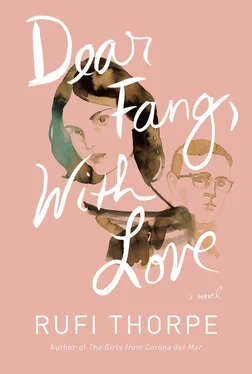Robert. That was my father’s name. Robert Cogle. I called and left a message on his machine, amazed by how cool and collected I sounded, how casually I mentioned that I might be his son and that if he ever wanted to have coffee or something I now lived in the city.
He called me back the next day. He invited me to his apartment, which was downtown. He had two bedrooms, and his rent must have cost a fortune. I wondered if my mother had been accurate in saying his career hadn’t been successful. The furniture was a hodgepodge of hypermodern and antique pieces he had saved and restored himself. He liked to find things on the street. He explained that the paintings on the walls were his own. He was just a dabbler, though, he said. The paintings were not realistic renderings or anything like that, but bright whimsical things, a red and green watercolor of a rabbit that looked about to melt and dissolve into thin air, a still life of a candelabra and some fruit done in different shades of gray. What struck me most, when he ushered me in, was that I looked nothing like him.
He was tall and narrow and dark-haired with a big booming voice. His eyebrows grew into fiendish, pointed tufts. I was very aware of the physicality of him, aware of our differences, but also eager to see any way in which we might be the same. We kept crossing our legs at the same angle, laughing at the same moment, in a way that was intriguing. Being raised by a single mother had made me a fervent believer in nurture over nature. I had wanted to believe that my father had absolutely no influence over my life, over who I was. But now that I was in the same room with him, I could feel a biological relatedness, a kind of hum of sympathy between our beings that was uncanny.
We made small talk, and I told him about my PhD program, hoping he would be impressed, though he didn’t seem particularly interested. “That’s good, that’s good,” he’d said. It did not seem the time to belabor the point that it was such an exclusive program, that I was excellent at what I did. I also did not tell him about Katya or about Vera. I presented myself as a successful scholar, an ordinary sort of guy, worried he would find me questionable or neurotic if I revealed more.
When the subject of why he had never been in my life was inevitably broached, he began to embark on a project of persuading me, trying to paint the picture from his point of view. I was more than willing to hear him out. I wanted to know, to know what reason he could have had. I had wondered all my life, after all. I had always imagined his decision not to be in my life as happening on a darkened stage, just him and me in a spotlight, a man incomprehensibly walking away from a baby who could not have yet committed any sin to make him go.
For one thing, it turned out that my mother had told other people before she told him, and so he heard about her pregnancy secondhand instead of from her. I could see that this would be off-putting. He went on, explaining that they had gone out to dinner to try to talk things through, and she had seemed to think they were on a date, and at one point told him she might be in love with him, which was absurd, he pointed out, because they had only slept together the one time and hadn’t even been dating. “She was obsessed with me, I’m afraid,” he said. His fingers were long and elegant and I was distracted looking at them as he gestured. He had always suspected she had gotten pregnant on purpose, to trap him. “Do you know what it’s like to be with someone who is just — Christ, it was like she was in a romantic comedy and she kept expecting me to kiss her! We couldn’t have a real conversation about any of it. She’d devolved into being a teenage girl.” He said the word devolved as though it disgusted him, as though it denoted a gross metamorphosis like something from Kafka.
I could see that all of this was entirely possible. I could see his point of view, even. He didn’t know this woman, and here she was, seemingly overly attached to him. His instinct had been to free himself. He claimed my mother began showing up at his apartment, loitering at the theater near his dressing room. They were members of the same company back then. “I couldn’t work with her anymore, and I told the artistic director that, and of course it made her think it was my fault she wasn’t getting any roles, and she turned quite spiteful after that. Honestly, she haunted me for years. I would be up for a big audition, and she would call ahead of time and spread nasty rumors about me.”
I had a hard time imagining my mother doing this, but I nodded and sipped the coffee he’d given me. He asked if I minded if he smoked. He smoked Nat Shermans. Even now that oxblood-colored box is burned into my memory, as were all the details of his apartment: the dark blue mid-century sofa, the glass kidney-bean-shaped coffee table, the peculiar odor of lacquer or paint drying, a resiny smell overlaid with brewing coffee. It surprised me that he smoked. So few real adults did by then. I lit up with him. “It wasn’t about you,” he said, “you see? But how could I try to raise a child with someone like that? We couldn’t see eye to eye on anything, and any inch I gave, she took a mile. I couldn’t trust her.”
There were many things I wanted to say. I wanted to say, “If you couldn’t trust her, why would you let her raise your child?” I wanted to say, “But my mother isn’t insane. She just factually isn’t. So maybe she was hurt because she had a crush on you, and she was scared and pregnant.” But I felt intuitively that if we were going to have a relationship, my allegiance to my mother would have to be covert. I was not going to try to argue him into understanding that he had been wrong. And I could also see that my mother’s flair for drama, her tendency to overplay the intimate moment, could strike a man as strange, could keep him from understanding that underneath she was really very practical, almost brutally so, and also, of course, very tender. Very easy to hurt.
I left that day feeling on edge from all the coffee and cigarettes. I remember I wasn’t paying attention as I crossed the street from his apartment, and I almost got hit by an ambulance. I thought that was remarkable at the time, that I hadn’t heard it coming, that I was so inside my head I had been deaf to the sound of sirens. Probably very few people had been run over by ambulances, and I had almost been among them. He lived near the Hudson River, just a few blocks in, and I could hear the seagulls screaming after the ambulance passed. I didn’t feel like my father had really seen anything of me. That first day had all been about him, about presenting himself to me. But I thought that would change as we got to know each other. The important thing was that I had met my father. And he painted pictures of bunny rabbits turning into air. And he liked to restore old furniture. Everything about him was just painfully cool. And he was my father.
We spent the next three or four months meeting for coffee or lunch every two weeks or so. He was very charming. A good storyteller. Nice to me. We both loved Shakespeare. “What’s your favorite play?” he’d asked.
“The Tempest,” I said, without hesitation, and he had crowed: “Mine too!”
And I felt so proud, proud that we had the same favorite play by Shakespeare. He showed me a novel he was writing and I was dismayed to discover that it was excellent. By that point, I had given up on ever publishing my writing, but I still did write and I could see immediately that my stories, foolish, awkward things about dating girls and not feeling enough for them, were nothing compared to his half-finished novel, which was set in Shakespeare’s time and had a decidedly fabulist bent, told from the point of view of a child who could remember things from the moment he was born. “I don’t know if I’ll finish it,” he’d said, waving my compliments away. His excellent novel was just a lark, a side project.
Читать дальше












